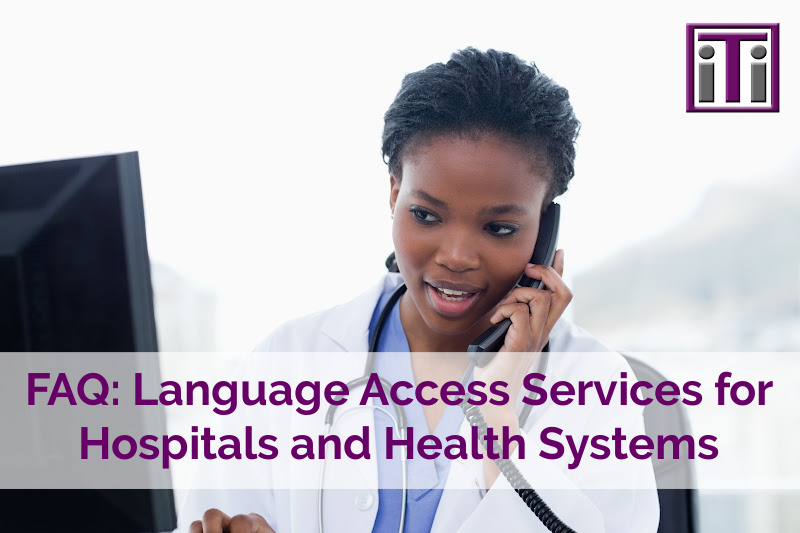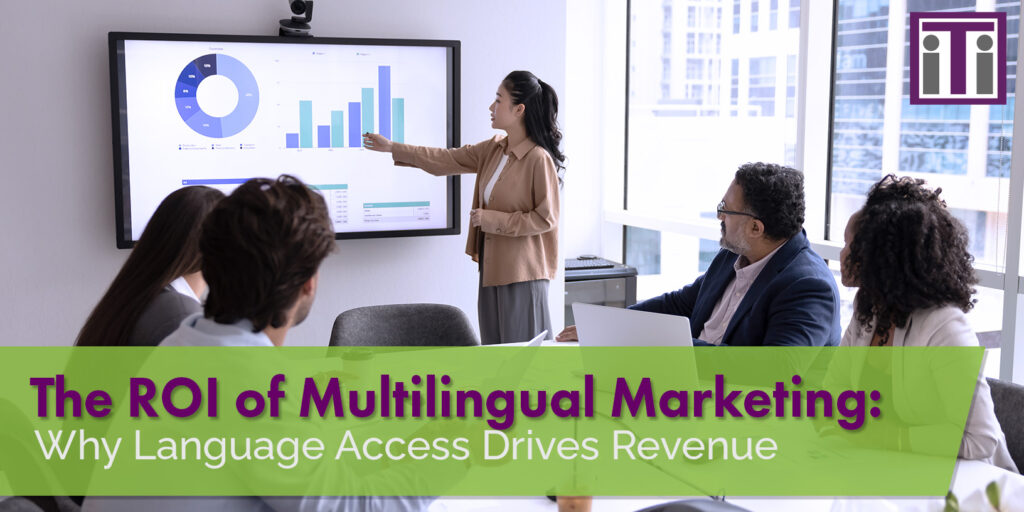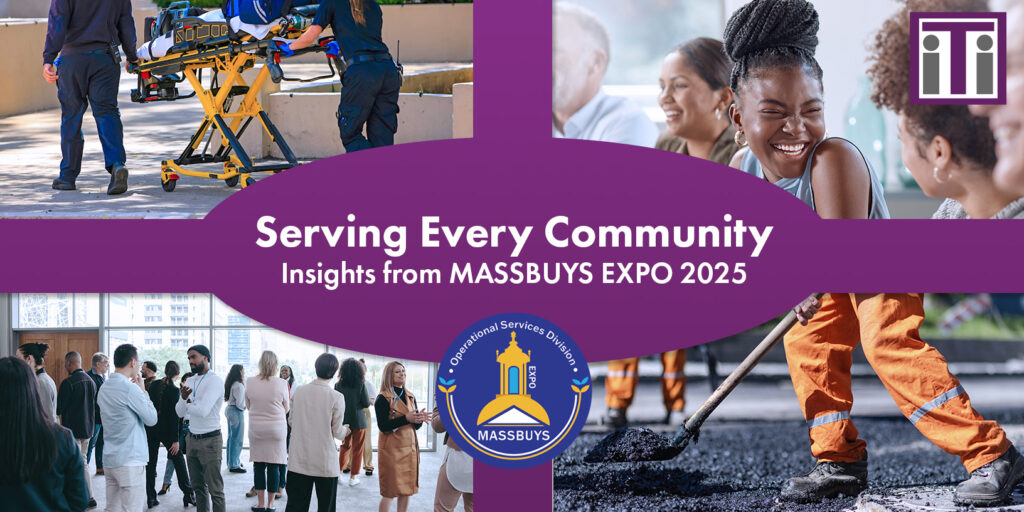FAQ: Language Access Services For Hospitals and Health Systems
Reading Time: ~8 mins

FAQ -Language Access Services for Healthcare
If you’re looking for healthcare interpreting or translation services, you likely have some questions. Fortunately, as a healthcare interpreting company serving hospitals and healthcare systems for over 35 years, we at Interpreters and Translators, Inc. have heard them all.
Below, we’ll answer some of the most frequently asked questions about language access services for Healthcare organizations.
Be sure to bookmark this page for future reference!
General Healthcare FAQs
Q: Are healthcare providers required by law to provide language services?
A: If your facility receives federal funds, it is legally required to provide language services. Title VI of the 1964 Civil Rights Act requires that “…no person in the United States shall, on the ground of race, color, or national origin, be excluded from participation in, be denied the benefits of, or be subjected to discrimination under any program or activity receiving federal financial assistance.”
The phrase “national origin” is important because it means that a person cannot be denied care because of the language spoken in their native country.
Additionally, Executive Order 13166, Improving Access to Services for Limited English Proficiency, was declared in 2000, and reiterates and strengthens Title VI requirements.
Q: How do I choose a provider for my language access services program?
A: To find the most ideal provider for your organization, begin by identifying companies that specialize in serving the healthcare industry. Then, evaluate each provider carefully to determine which one is the best fit. At iTi, we place a strong emphasis on working closely with our healthcare clients to ensure that we can meet their needs effectively. We work through many technical and logistical details with our clients before entering into a contract.
We recommend using a single language service provider (LSP) to serve your organization. While you could use different vendors for different services, using a single provider will give you the greatest control over costs while ensuring the highest level of service and care. Your staff will never have to decide which company to call in an emergency situation. Additionally, receiving a single bill for all services will make is easier to track costs and evaluate the effectiveness of you language access program.
Q: If we choose to work with iTi, how will you support our hospital in implementing the language access plan?
A: One aspect that distinguishes iTi from our competitors is our close collaboration with hospitals and health systems during every stage of implementation. Rather than merely selling our services, we strive to seamlessly integrate them into your organization for effortless accessibility. We prioritize providing staff education and training on the optimal utilization of our services, including when and how to work with interpreters, as well as how our services support them in doing their job.
Our implementation process is tailored to each organization’s unique needs. Depending on the size of the organization and the scope of the program, implementation can take anywhere from a few weeks to several months. For each implementation, we allocate a dedicated team of employees to oversee implementation based on the principles of “Lean Six-Sigma.”
Q: Are interpreters and translators subject to background checks?
A: At iTi all of our linguists must undergo and pass background checks prior to being hired. When needed, we are able to provide linguists who have various levels of security clearance. Our rigorous training program for medical interpreters includes HIPAA instruction, and all iTi contracted linguists (and internal employees) must sign an agreement to comply with HIPAA rules.
Medical Interpreting Services FAQs
Q: What’s the difference between Video Remote Interpreting (VRI) and in-person interpreting?
A: Video Remote Interpreting is a service that connects an off-site interpreter with the client and the LEP individual via a secure, encrypted video connection. iTi’s VRI service can be accessed using any device with a camera and microphone, such as a computer, tablet, or smartphone. A strong Wifi signal is a must.
A VRI interpreter can also join a conversation or meeting taking place on a streaming platform such as Zoom, Microsoft Teams, Skype, Webex, etc., or even with your internal custom application. VRI can be either pre-scheduled or on-demand.
In-Person Interpreting involves an interpreter traveling to the same location as the client and person in need of interpretation, so that they can be face-to-face with all parties, during consultations, medical procedures, or even in a patient’s hospital room.
Q: How much lead time is needed to schedule in-person interpreter services with iTi?
A: While we prefer as much lead time for interpreters as possible, we are often able to provide an in-person interpreter with as little as a 1-hour notice. We establish a process of handling emergency situations and always prioritize providing the best possible solution, be it over-the-phone (OPI) or video remote interpreting.
Q: What’s better: In-person or Video Remote Interpreting (VRI)?
A: In-person interpreting remains the superior choice whenever possible and provides the best patient experience. The level of communication quality that comes with having an interpreter in the same room is irreplaceable. Body language plays a crucial role in communication, and it is easier to interpret when the individual is present in the same room. Additionally, having the interpreter physically present in the room can help patients feel more at ease and increase their confidence in the situation.
However, there are situations when in-person interpreting is not practical. For rare languages, available interpreters may not live within commuting distance, so choosing one of our remote interpreting options (VRI or OPI) may be a better choice. In cases of emergency, the fastest solution is often the best. VRI is available in our most common languages on-demand 24 hours a day, 365 days a year. OPI is also available 24/7/365 in over 2560 languages.
Q: Is Video Remote Interpreting (VRI) HIPAA Compliant?
A: Yes. All communication and client information is treated with extreme sensitivity. At iTi, have strict measures in place to ensure full confidentiality. These include:
- On-site server room designed to meet Department of Defense standards
- Encrypted communication including video, phone, email, SMS, etc.
- Confidentiality agreements with all linguists
- Server logs are sanitized of patient data to prevent information leakage.
There are many more measures in place to ensure your data is safe and confidential. Our Healthcare sales team will be happy to provide you with more detailed information.
Q: Is it okay to use a bilingual staff member for interpretation?
A: Interpreting is a trained skill and is different that fluency. Interpreting for healthcare requires an even more specialized set of skills.
Unless your staff member has been specifically trained and assessed as a Qualified Medical Interpreter, it is dangerous to use them in this capacity. Not only does this put patient safety at risk but can also open your organization up to malpractice and civil right lawsuits. iTi offers language proficiency assessments and medical interpreter training programs for our clients’ bilingual staff.
Click here for a more in-depth discussion of this topic.
Q: How do I access Over-the-Phone (OPI) interpretation services? Do I need special equipment?
A: iTi’s VRI service can be accessed using any smart device, as long as there is a strong Wi-fi signal. If the conversation being interpreted is taking place over the phone, you can access our OPI service the same way you would normally make a conference call. iTi will provide you with a dedicated number and access code.
Your call will be answered by a live operator who will ask for the language needed and connect you with your interpreter, typically in under 30 seconds. iTi’s over-the-phone service is available 24 hours a day, 365 days a year in over 250 languages.
If all parties are in the room, and you wish to access OPI service, you may also use a dual-handset phone. iTi will assess your needs to see whether you can use your existing equipment. If new equipment is needed, iTi will assist you to find the best solution.
Q: What type of in-person and online training is available for healthcare employees?
Before implementation beings, iTi will outline a customized training program which can be performed in person or online, according to your needs and preferences. We’ll continue to support you with your own training efforts as you onboard new staff or if your needs change.
Medical Translation Services FAQ
Q: What is the process for getting a document translated?
A: You can upload documents to our secure FTP portal, send them via encrypted email, or we can integrate with your existing ERP system. Whatever method you choose, we’ll ensure that your documents are translated accurately and securely.
Q: What’s the typical turnaround time for a translation project?
A: The turnaround time depends on the length and formatting complexity of the document. Most one- to two- page documents can be completed in about 24 hours.
Q: Can we use an untrained bilingual staff members to translate small documents, such as prescriptions of follow-up care instructions?
A: Medical translation requires a specific set of technical skills, and it’s important to use a trained professional to ensure accuracy and patient safety. Don’t take unnecessary risks with a patient’s health and safety to save a little money. Learn “The Dos and Don’ts of Medical Translation” here.
Do you have any other questions that we didn’t address? Click on the link below and one of our healthcare specialists will contact you soon.
| Contact Us |





